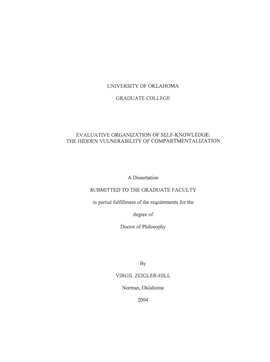| dc.contributor.advisor | Showers, Carolin J., | en_US |
| dc.contributor.author | Zeigler-hill, Virgil. | en_US |
| dc.date.accessioned | 2013-08-16T12:19:24Z | |
| dc.date.available | 2013-08-16T12:19:24Z | |
| dc.date.issued | 2004 | en_US |
| dc.identifier.uri | https://hdl.handle.net/11244/725 | |
| dc.description.abstract | Three studies explored the possibility that the structure of the self-concept is associated with fragile self-esteem. The model of self-concept structure examined in the present studies is evaluative organization, especially the distinction between compartmentalization and integration. Compartmentalization is the tendency to segregate positively and negatively valenced self-beliefs into separate self-aspects, whereas integration is the tendency for attributes of opposite valence to appear in the same self-aspects. Study 1 showed that compartmentalization was associated with state self-esteem that was less stable over time and that appeared to be more reactive to daily events and stress. Study 2 found that the state self-esteem of compartmentalized individuals appeared to be primarily reactive to social events and that the self-esteem of these individuals was contingent upon meeting certain standards (e.g., approval of others and physical appearance). Study 3 employed a laboratory manipulation of social rejection to confirm that the state self-esteem of compartmentalized individuals was highly reactive to social rejection. Findings across the three studies suggest that individuals with compartmentalized self-concept structures may be best characterized as possessing fragile self-esteem, whereas individuals with integrative self-concepts appear to possess self-esteem that is relatively secure. These results suggest that some of the benefits believed to be associated with compartmentalization (e.g., high self-esteem) may actually reflect defensive processes rather than true psychological adjustment. | en_US |
| dc.format.extent | x, 100 leaves : | en_US |
| dc.subject | Psychology, Personality. | en_US |
| dc.subject | Psychology, Social. | en_US |
| dc.subject | Self-perception. | en_US |
| dc.subject | Self-esteem. | en_US |
| dc.title | Evaluative organization of self-knowledge: The hidden vulnerability of compartmentalization. | en_US |
| dc.type | Thesis | en_US |
| dc.thesis.degree | Ph.D. | en_US |
| dc.thesis.degreeDiscipline | Department of Psychology | en_US |
| dc.note | Adviser: Carolin J. Showers. | en_US |
| dc.note | Source: Dissertation Abstracts International, Volume: 65-02, Section: B, page: 1076. | en_US |
| ou.identifier | (UMI)AAI3122309 | en_US |
| ou.group | College of Arts and Sciences::Department of Psychology | |
